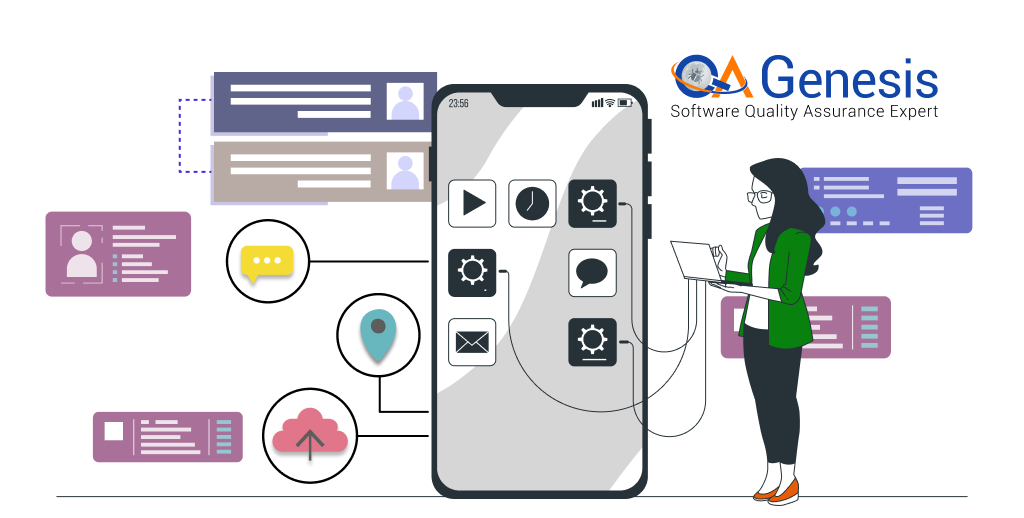Digitization is taking the world by storm. However, there is no similar customer experience compared to the offerings of the great business apps. These apps serve only sales and marketing but offer a great form of customized products and services.
Hence, any business, small or big, startup or established, etc., can’t miss the customized apps for their customers. So, can you create and market your business app like it only?
Mobile performance testing serves the excellent purpose of launching effective and high-performing apps.
Let’s get on the basics about performance testing and the top reasons that stress its requirements for any business.
Performance Testing: All You Need to Know
Performance testing is a detailed procedure that tests any software application’s speed, stability, scalability, reliability, response time, and resource usage.
The parameters so mentioned are tested under a specific workload. There are different types of performance testing that include:
- Load testing: It helps determine the app’s working performance with the expected user load. It helps fix the primary glitches in the app.
- Spike testing: It helps determine the app’s performance when it is exposed to an extreme and sudden increase or decrease in a particular load. The app’s behavior is analyzed during such spikes.
- Stress testing: It helps to find out the breaking point of an application when working under extreme workloads while bearing heavy traffic.
- Endurance testing: It helps test the capacity of the app to manage the expected load for a longer duration.
- Volume testing: It aims to run the software app faster with varying database volumes. A variety of data is stored in a database, and the experts monitor the app’s behavior.
- Scalability testing: It helps determine the software app’s effectiveness and support when the customer load is set to increase.
The popular and widely used performance testing tools include:
- LoadNinja
- Jmeter
- HP LoadRunner
- NeoLoad
Top Reasons to go for a Performance Testing
Investing in performance testing can be the best decision for any business due to the following main reasons:
- Evaluating the region-wise app performance
Not all regions have the same internet connectivity and network coverage. So this comes to the first and foremost answer to ‘why your app needs performance testing tools?’
It is all about knowing the performance of your app in a specific region or country. The app’s performance on 2G, 3G, or 4G connectivity helps the testers optimize the app according to the region’s requirements.
- Performance when the user base is increased
Any business app aims to increase sales that start by expanding the user base of the app. The app’s promotion to current and prospective customers further stresses app optimization when the user base increases.
Hence, the mobile application development stresses ensuring the same speed and stability by the mobile testers and locates the bugs.
- Eliminating errors
The long list of app errors like uploading errors, broken download links, checkout errors, and frequent timeouts can lead to disappointment by the users. These errors make the user furious about the app and the services.
The increased number of app uninstalls and exits earn the brand a bad reputation. Hence, performance testing is the first line of defense that checks for the different errors and helps correct these errors on time to prevent any bad name to the company.
- Appropriate feed to stakeholders
While the main aim of performance testing is evaluating the app’s behavior in different conditions like different regions, increasing user base, checking errors, etc., this is not it. Instead, the dedicated performance testing offers correct and understandable feedback to the main stakeholders, who are decision-makers.
The management can learn about the application’s reliability, response time, scalability, and speed of their customized apps. The different performance testing results judge the app issues or errors and offer dedicated fixes that the management can directly approve for quick implementation.
Quick Checklist of Performance Testing
It is always great to have a quick list prepared while you’re dealing with dedicated performance tester. You may or may not have detailed knowledge about apps and their associated concerns, but knowing the details of terms associated with performance testing increases the chances of proper testing experts.
Here is a quick look at the top mobile app performance testing checklist that does any business prepared for the performance testing:
- Memory: Memory use, private bytes, memory pages/ second, committed memory, etc.
- Processor: Processor usage, bandwidth, disk time, disk queue length.
- CPU: CPU interrupts per second, thread counts, top waits, database locks, rollback segment, throughput, etc.
- Network: Network output queue length, network bytes total per second, amount of connection pooling, etc.
Wrapping Up
The performance testing for the mobile application ensures that only high-performing and qualified apps are made available to the customers. While it is all about aiming for high levels of customer satisfaction, nothing matches the power of starting with a dedicated business app.
The customized services, sales & marketing benefits, and the one-point solution for your business can’t get live without being tested. The timely responses to the possible glitches and update patches work dedicatedly towards staying high in the digital ecosystem.
Hence, whenever you plan to launch a new app for your business, mobile app testing should be an integral part of the app development lifecycle.
